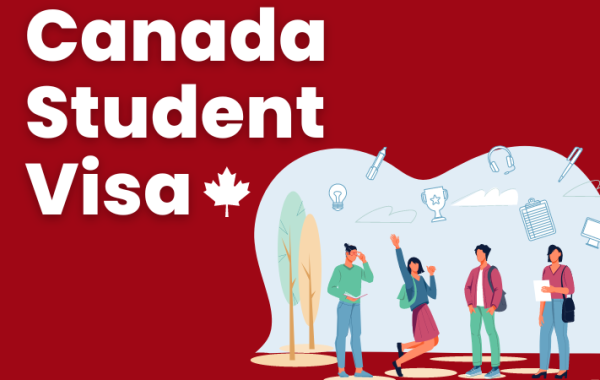Studying abroad is increasingly becoming one of the preferred career choices among the students of India. Especially, most of the students who are aspired in studying abroad consider Canada as their first choice of preference.
It is because the institutions in Canada offer excellent education and help the student in creating a solid foundation for their future. Canada also offers plenty of jobs through post graduation work permits (PGWP) and comparatively faster permanent residency(PR) for international students.
Note: The Canada study visa requirement is updated with regulations regarding Covid -19 pandemic. After September 7, 2021 students outside Canada are only allowed if they qualify for the fully vaccinated traveler exemption.
This blog will cover topics like who can apply for a Canadian student visa? How to apply? What are the requirements? Whom to apply? procedures etc.
What is a Study Permit?
A study permit is the most important document that is issued by the government of Canada. This allows students from other foreign countries to study at Designated Learning Institutions (DLI) in Canada. The study permit requires some documents that need to be submitted during the process. A study permit application fee is around 8750 INR.
A letter of acceptance from a Designated Learning Institution is a must. If you could not submit the documents that are required due to Covid-19, you should provide a letter of explanation.
The study permit is allowed to extend only if there is conditional acceptance from the DLI. Also, there is an option in extending the study permit if you are not able to finish your course before the valid permit date.
If you finish your course before the valid permit date, the permit will stop being valid for 90 days after the completion of the course. The university where you are graduating will provide you with the course completion certificate or degree as soon as you complete the course.
One other thing to know regarding study permit is a letter of introduction. This letter will be sent to the students who are applying from outside Canada. The letter of introduction provided is not the actual study permit but it has the electronic Travel Authorization (eTA) which is linked to your passport.
The electronic Travel Authorization has a validity of 5 years until your passport expires. These two documents are examined by the border services officer before the approval of the study permit.
Eligibility Requirements for Canadian Student Visa
The study visa will be allotted for the students only after their study permit gets approved. A visitor visa with a study permit is considered a study visa. There are no separate procedures to apply for a visitor visa. The Canadian government provides the visitor visa soon after the study permit gets approved. The foremost eligibility is to get enrolled in a Designated Learned Institution (DLI).
Following are the eligibilities required to apply for Canadian student visa:
- Letter of Acceptance – The letter of acceptance from the institution should be attached with the study permit application. The letter of acceptance values as a provisional acceptance to the institution.
- Valid Passport – A valid passport that is linked to some of your identifications such as Aadhar card, voter identification, etc. is required. Also, recent passport-size photographs should be attached with the name and date while applying.
- Financial Capacity – A proof of your financial capacity to manage your tuition fees is required. Also, it is important to mention the source of funds when attaching the proof. For example, students who are funded through student loans should attach documents provided from the bank
- Covid-19 traveler exemption – The Canadian government updated the regulations recently considering the Covid-19 protocol. The student who is traveling to Canada must possess a traveler exemption certificate which states that the student is fully vaccinated. The student must also possess the negative covid-19 molecular test before leaving their country.
- Letter of Explanation – A letter of explanation should explain the reason for you to study in Canada. The letter should also state that you abide by the conditions listed on the study permit application.
- IELTS results – It is important to provide your mark sheet on the English proficiency test.
- Academic documents – A proof of your academic documents having information of your schooling, grades, conduct certificate, and transfer certificate.
- Other documents – some documents are requested by the Canadian government such as medical certificates, police certificates, etc. These are the documents that should be provided when asked for.
Reasons for Getting a Study Permit in Canada
Quality higher education and job opportunities are the two important reasons for getting a study permit in Canada.
1. Continue Education
Students who are willing to do their higher studies in Canada can extend their study permit from inside Canada. There is a relaxation given for the students who want to update their study permit. Most of the International students extend their study permit inside and prepare for another graduation.
2. Job Opportunities
A study permit in Canada benefits students who want to work while studying without a work permit. A student with a study permit is allowed to work for a maximum of 20 hours a week without a work permit. This helps the student to gain professional experience during graduation.
Graduating at a Designated Learning Institution (DLI) using the study permit can benefit the student with stay-back options and also gives additional support in the Post-Graduate Work Permit (PGWP) process.
Documents needed to apply for Study visa in Canada
- Letter of Acceptance
- Valid Passport
- Study Permit – Letter of Introduction and eTA
- Proof of your financial capacity
- Letter of Explanation
- Medical Certificate
- Bank Account
- Bank statements
- Police Certificate
- Proof or letter from the source of funds
- IELTS mark sheets
- Certificat d’acceptation du Québec (CAQ) – If the student is studying in Quebec.
Post-Graduate Work Permit and Study Permit
Studying at a Designated Learning Institution (DLI) with a study permit in Canada may provide you the opportunity to get a Post-Graduate Work Permit (PGWP). Students who have graduated from DLIs inside Canada can apply for a work permit with a graduation certificate or a letter from the institution.
The PGWP program is only applicable for students with more than an 8-months program that has a certificate. Students who have graduated from programs more than 8-months have validity in the work permit for the same amount of months for their programs.
Students with two years have a validity of three years in the work permit. The PGWP is only applicable if you have a validity of at least 180 days in the study permit.
Intakes in Canadian Universities
The Universities in Canada offer intakes in Fall, Winter, and Summer. There are a total of three intakes in an academic year. The intakes for major programs happen during the fall season. The Fall intake starts in September and ends around early January. The fall intake is considered the most important intake among the other intakes.
The majority of the international students use this intake for getting admission to the programs they wanted to study. The winter Intake happens from January to May, for some specialized courses.
Also, The January intake is used by the universities as an additional admission process to fill the left-out seats in the Fall intake.
Admission for short-term programs like data science, computer science, business management comes under the Summer intake. The summer intake starts in May and ends in August and is the intake with the least number of applicants.
Unlike the Indian intake system, the intake system followed in Canadian universities is quite flexible for the students to choose their course of interest.
Anyways, being early for the process required for any of the three intakes is important. The main thing is to shortlist the best intake for yourself according to the course you wanted to study.
Cost of Studying in Canada
Studying Abroad is expensive when compared to the cost of studying in India. Even though the cost of studying in Canada is more expensive than in India, the Canadian universities offer the best education with a lower tuition fee when compared globally. 90% of the students who graduated from Canadian universities are offered PGWP in six months.
The PGWP which is valid for three years will help the student earn a decent amount of money to balance their education loans or financial issues. The student should provide the institution and the visa officers with proof of funds.
Proof of funds is nothing but a document proving that you can pay your tuition fees. The documents regarding student loans or source of funds should be attached during the study permit process.
| Program | Average tuition Fees (Per annum) |
| Diploma | 6,00,00 – 9,00,00 INR |
| Under – Graduate | 8,00,000 – 12,00,000 INR |
| Post – Graduate | 10,00,000 – 14,50,000 INR |
| MBBS | 22.50,000 INR |
Steps to get Study Visa in Canada
A study visa in Canada is a combination of a study permit and a visitor visa, there is not an ultimate thing called a study visa in Canada but a visitor visa with a study permit is considered a study visa. Several procedures should be followed in applying for a student visa. Following are the steps you need to follow to get a student study visa in Canada.
- Step 1: Clarity – There needs to be a clear understanding for yourself to study in Canada. You need a strong mindset and a valuable reason to study in Canada.
- Step 2: Shortlisting – Shortlisting of colleges, universities, places, programs should be done with keen research. Shortlisting institutions and courses through research should be done with credible sources.
- Step 3: Eligibility- Make sure that you are eligible for the requirements asked for. If not, prepare the requirements that make you eligible for the visa.
- Step 4: Entrance exams – a student with an aspiration in studying abroad should surpass the standardized exams like IELTS, TOEFL, GMAT, GRE, and SAT. These exams are written based on the colleges and courses the student prefers for. A decent mark in IELTS is considered in most of the universities and colleges in Canada.
- Step 5: Document preparation – In the visa process, several documents need to be attached. You should be able to provide the documents that are asked by the officers. There are also some additional documents like police and medical certificates asked by the visa officers during the verification part. Cross-checking the documents is important, there might be misplacing and missing documents. So it is necessary to cross-check the documents before submitting them to the visa officers.
- Step 6: Source of funds – Sorting out a source of funds for your abroad studies through education or student loan is necessary. You need to submit the required documents that prove you can afford your tuition fees.
- Step 7: University application – After shortlisting the university, the application process should be started as soon as possible. The application process is quite a difficult one. You need to be attentive while applying. The data entered in the applications should be credible.
- Step 8: Offer acceptance – The “Letter of Acceptance” is a confirmation that you are provisionally admitted to the program in that college. The letter of acceptance gives all the information about fees, accommodation, duration, remittance date, etc. Also, the letter of acceptance is not the final approval, but it acts as a supporting document that helps in the approval of a student visa.
- Step 9: Get a study visa – The Canadian government offers you a letter of introduction after applying for the study permit. The letter of introduction comes with the electronic Travel Authorization (eTA), which is verified by the border department. After verification, the study permit is approved and the visitor visa is granted automatically. A study permit with a visitor visa is issued as a study visa.
- Step 10: Accommodation and Transportation – The flight ticket rates are cheaper when you book them earlier. It is important to carry the necessary documents while traveling. Selecting places for accommodation in Canada can be done through certified websites, consultants, or seeking advice from authorities in your institution can reduce the burden of searching for a place to stay.
Spouse and Dependents in Student Visa
The Canadian government is flexible in including their spouse or dependents during the study permit applications process. This creates an impact on the approval of study visas and it is left to the study visa officers.
The spouse or the dependent traveling with you should go through the process of getting them a visa. The spouses accompanying the students have a scheme called spousal open work permit which helps them to work for an employer in Canada.
Top 10 Universities in Canada that have a High Acceptance Rate for International Student Visa
The universities in Canada are maintained to a world-class standard. Canada attracts a huge population of international students every year. The following colleges in Canada have a high acceptance rate for international students
- University of Montreal
- University of Toronto
- University of Alberta
- McGill University
- Simon Fraser University
- University of Waterloo
- University of Calgary
- Carleton University
- Lakehead University
- York University
What is the IELTS Band Requirement for a Canadian Student Visa?
Your IELTS band score is a deciding factor in getting admission to colleges and universities in Canada. The IELTS band score is from 0 to 9. There are four sections in any IELTS exam which consist of reading, writing, listening, and speaking.
You need to score a total of 6.0 in the IELTS in order to get admission for undergraduate courses in Canadian universities. The minimum band requirement for postgraduate is 6.5. Scoring 5.5 and 6.0 are also given relaxation in some colleges in Canada.
Minimum Bank Balance Required
To study in Canada, you should have a minimum of 5,00,000 INR – 6,00,000 INR in your Canadian bank account. You should have this money in your Canadian bank account even after you pay your tuition fees. The Canadian Banks are flexible in offering students to open bank accounts
Apply through Student Direct Stream
Student Direct Stream (SDS) is used to make the study permit process faster. Through SDS, you can get admission to most of the Designated Learning Institutions (DLI) in Canada. The student direct stream can only be applied online. Students who apply through SDS should possess proof of the Guaranteed Investment Certificate (GIC).
The Guaranteed Investment Certificate is nothing but an investment in a Canadian Bank Account with a guaranteed return. India is one of the countries with eligibility for SDS. The procedures that need to be followed and the documents that need to be attached are almost the same as the normal study permit process.
How and Where to Apply for SDS?
There are several steps involved in processing the Student Direct Stream (SDS).
- The study visa officers only accept online applications when you apply through SDS. Paper applications are only for the students who go through the regular study permit process.
- You need to organize the documents that are required to apply via Student Direct Stream. The documents required to apply via SDS are IELTS results, Guaranteed Investment Certificate (GIC), Tuition fee receipt, letter of acceptance, medical certificate, police certificate, etc. You should also add some additional documents if the study visa officers ask for them.
Canada Student Visa Fee
A Canadian study visa costs around $150 which is approximately 8500 Indian rupees. The study visa to Canada can be applied online if you have a proper scanner and camera to scan and upload copies of documents. Applying for a student visa through Student Direct Stream costs the same as the regular student permit.
Study Permit Renewal
A study permit validity is always given an extra 90 days from the duration of the course. To extend your study permit in Canada, you need to apply for a new study permit and stay in Canada as a temporary resident. Applying to extend your student permit should be done 30 days before validity.
You need to apply for an extension of your study permit online if there is a problem with the online application you can apply through paper. Applying online is welcomed because it is transparent, easy, and cheap.
You cannot study in any of the DLIs in Canada if your study permit has not been restored. The restoration of the study permit costs around 20,000 INR.
Backlogs and Student Visa
Most of the DLIs in Canada accept a maximum of four to five backlogs. You should have a minimum of 70% in the grades on your last degree or qualification. For PG programs, the institutions in Canada accept students with 7 to 8 backlogs with a minimum of 65% in undergraduate.
If the students with backlogs got admitted to one of the colleges in Canada, it will not affect their study visas. All you have to provide is a letter of acceptance from the institution to the study visa officers.
English Language Requirements
A student with an aspiration to study in Canada should develop their English language skills. English is the necessary language in Canada. Most of the people in Canada speak English. To get admission to the reputed DLIs in Canada, you need to surpass the language skills exam which is the IELTS.
International English Language Testing System (IELTS) is the important exam a student should surpass if they want to study in Canada. Other than that, you have to develop your communication skills to approach or negotiate any kind of issues you may be facing in Canada.
Canada, Student Visa Processing Time
The processing time for study permits in Canada varies according to the country. The study visa processing time for Indian students is around 7-10 weeks. Your application is moved from the visa application center to the study visa officers and the biometrics process is done.
You can also get your student visa in 20 days if you apply through the student direct stream. The processing time depends on the number of applicants.
Canada Student Visa Requirements after 12th
The students who are aspired in studying abroad after 12th have a variety of choices to study in Canada. The students who want to study abroad after the 12th should attach some documents during the study permit process. The following are the documents that require to study undergraduate courses in Canada
- Letter of acceptance
- A Valid Passport
- IELTS Marksheets
- Letter of Recommendation
- Statement of Purpose
- Transfer Certificate
- Financial documents – A proof you can manage your studies financially
- Medical Certificate and Police certificate
- School Completion proof
- Academic Documents







